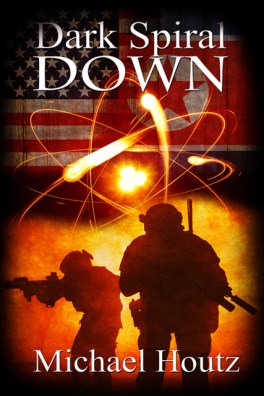When a Delta operator goes missing, his brother, a former elite MMA fighter, becomes hellbent on finding him . . . only to quickly realize that there’s more going on than he first thought.
Dark Spiral Down, the debut thriller from Michael Houtz is a fast-paced, action-packed thriller written in the same vein as Peter Kirsanow and Brad Taylor. Just ahead of his first thriller hitting bookstores, I caught up with Houtz, who agreed to go on the record for our five questions segment. Read the full Q&A below, then click here to order your copy of Dark Spiral Down today!

TRBS: Before we get into the book, tell us a little bit about your background before you started writing . . . and what made you decide to finally write your first book?
Houtz: Like most people in the business, I loved telling stories as far back as grade school. I dabbled with creative writing through high school and college. I even wrote some Fantasy fiction in my twenties that never amounted to much. Enjoying eating and air conditioning, I suppressed the desire for a career writing and pursued medicine instead. Seemed like a decent fallback position—though not as cool. Once I had a wife and two young sons, the strain of raising our kids with two parents in the medical field working 90+ hours a week each was apparent in our marriage and in my sons’ lives. Watching other people raise our boys was really tough. Eventually, my wife and I had a conversation that would change the direction of all our lives. Soon after, I announced an early retirement to play the role of stay-at-home dad and pursue the dream I held decades earlier of becoming a published author. Of all the personal pursuits in my life, that one decision was the most terrifying thing I’d ever done. Took me three days to finally send that five-sentence email to the group. I landed on a beautiful island, burned the boat, and
made it my mission to succeed.
TRBS: How did you come up with the story idea for this one?
Houtz: I distinctly remember driving somewhere and the radio was tuned into NPR. The discussion revolved around North Korea and the U.S. in talks regarding the DPRK’s nuclear ambitions. North Korea hinted at halting their program for a litany of demands. Same old song and dance. I had a flash of inspiration that perhaps they were considering the Free World’s request of a denuclearized Hermit State because they had something in their back pocket even more powerful than nuclear weapons. I brushed past biological as too easy and predictable. What if they held something both undetectable and deadlier than anything previously known? I drilled down from there and wondered what a storyline looked like if that same ‘thing’ was actually meant to help people but held potential for vast destruction. I knew an American team would be involved in somehow stopping such an occurrence and developed characters from the U.S. who are intimately familiar with that part of the world. Like most things meant to be in our real lives, the entire storyline fell out of my imagination with little effort. All I had to do was learn to write.
TRBS: What kind of research did you have to do before actually sitting down to write?
Houtz: A ton—or so I thought. Once I’d latched onto the idea of cold fusion, I read everything I could on the subject. I didn’t go into great detail on the mechanics of the book’s device, but I felt it important to understand what a militarized potential outcome might produce. I’d never been to that part of the world, and I became a Google Earth devotee on satellite and street-level imaging. I felt the actual location was critical to the pacing of the storyline and the urgency the characters faced. I came across the city of Dandong, China as the perfect backdrop given that is the only location hosting a real-life physical connection, a train bridge, spanning China and North Korea. I researched humidity, temperatures, fauna and elevation changes of the terrain, Yalu river currents and all things related to day-to-day life in that city. The more I discovered, the more convinced I became the location was perfect for my needs. I’m fairly versed in martial arts but never spent time in Spec Ops and worked with acquaintances familiar with that world. Buddhism was a blast to learn about—especially the Shaolin monks.
TRBS: What is your writing process like? Are you an outliner, do you have a target word count that you try to hit each day?
Houtz: I work toward an average of a chapter a day. That fluctuates, obviously—especially with handling the newness of the promotion of one book and continuing production of new material. I’m finding my balance of outlining versus pantsing. This title flew out of my imagination so fast that all I really worked with was a sheet of paper, number of chapters, and the POV character for each. Probably not what I’d recommend to other aspiring authors and not what I’m striving for on future books. I did try heavy outlining for a bit, but I ALWAYS went off script when I gave in to the scenes coming to my mind’s eye. My best work comes when I just write what I see in the movie playing out in my head.
TRBS: Lastly, now that Dark Spiral Down is set to come out, what’s next for you?
Houtz: This book was, and still is, meant as a series. It’s merely the introduction of Cole Haufner and supporting cast. He’s just getting started with his newfound skills and a new mission in his life—the recovery of children taken out of the U.S., illegally, by a parent to a country that doesn’t recognize U.S. law and children’s rights. There are nearly 90 countries under that definition. I better get moving.
A little side project I’m doing is writing 1-2 short stories for an Anthology that hopefully comes to market in the next 6-12 months.
My next goal, however, is to finish my first WIP, a medical thriller with ties into the action subgenre. Think Robin Cook topped with some Vince Flynn spices (standing in formation with Vince at Marine OCS is the closest thing to cosmic forces I’ve ever experienced). I’ve partnered with an amazing industry-insider editor, and I’m absolutely convinced we’re gonna crush it. My hope is this title is my big break. If not, it won’t be for lack of effort.
Praised as “one of today’s finest book reviewers” by New York Times bestselling author Gayle Lynds, Ryan Steck (“The Godfather of the thriller genre” — Ben Coes) has “quickly established himself as the authority on mysteries and thrillers” (Author A.J. Tata). Steck also works full-time as a freelance editor and pens a monthly thriller column for CrimeReads. For more information, be sure to follow him on Twitter and Facebook. He currently lives in Southwest Michigan with his wife and their six children
